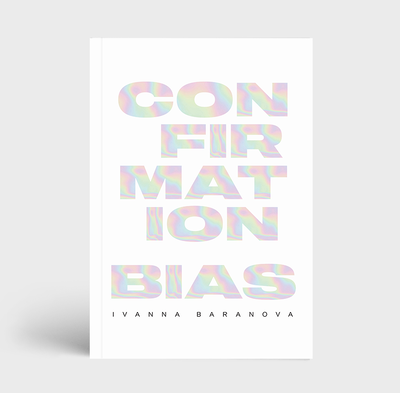Ivanna Baranova's Confirmation BiasReviewed by Carl Watts
|
|
Much has been made of contemporary poetry’s residence in the academy and related institutions. For all the accuracy of those charges, however, poetry critics are often themselves guilty of focusing on verse that is institutionally ensconced at the expense of that which in some way remains defiantly outside this ecosystem. The oversight is especially glaring given that this kind of poetry is, at least in theory, well positioned to reach toward a larger writership (if not really a true readership of the sort whose absence we so often bemoan).
Montreal’s Metatron Press embodies this potentiality to some extent. It publishes young, Canadian as well as international, often only tangentially academic writers; while it has some avant-garde resonances, it just as often skews toward the accessible and the confessional. Its eclectic approach is nicely encapsulated in its name: seemingly a vaguely technological buzzword the stylized vacuity of which matches the vaporwave aesthetic of the press’s website and many of its books, the moniker is also that of a recording angel who appears in apocryphal Judaic texts and Islamic scripture. Whatever depth exists (or doesn’t) in specific collections, Metatron is as focused on the contemporary, youthful, and irreverent as it is (with its consistent focus on intersectional identities and a range of lived experiences more generally) anchored in a deeper cultural tradition. Ivanna Baranova’s Confirmation Bias captures this of-the-moment eclecticism in several respects, and it most certainly has an eye toward accessibility. Immediately noticeable is its use of very short lines, including even single-word entries that draw the eye quickly down the length of a page. Individual poems sometimes use this feature to their advantage, such as when “aloe,” with sequences like “translucent / heaven” and “low gleam / in this eternal / rhinestone / aptitude,” separates the products and affects of late-capitalist consumerism into gauche units of half-meaning. The brevity of Baranova’s lines also emphasizes the interjectory qualities of phrasings that would, as part of longer lines, seem more like mere shifts in mood. (In its first stanza, “overture” moves from the indicative “melodic contact / tends to prioritize / the implosive—” to “the self-directed fuck / fuck fuck.”) She can be good with endings, too, like when changes in pace give way to prosaic confession at the conclusion of “funds”: |


